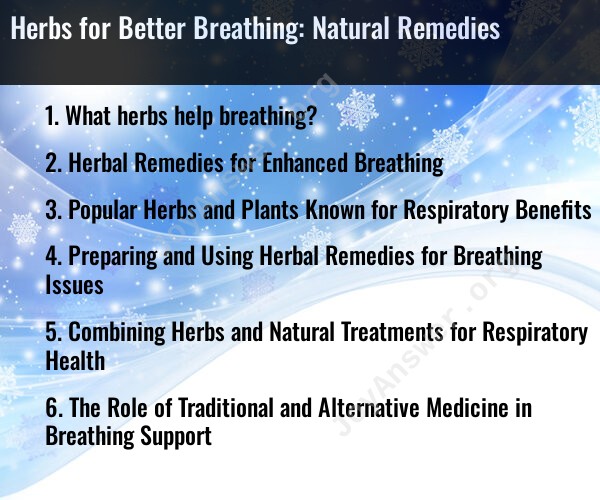What herbs help breathing?
Several herbs are believed to have potential benefits for respiratory health and may help improve breathing. However, it's important to note that herbal remedies should not replace medical treatment for serious respiratory conditions. Always consult with a healthcare professional before using herbs, especially if you have a chronic respiratory condition. Here are some herbs that are commonly used to support respiratory health:
Peppermint (Mentha x piperita):
- Peppermint is known for its menthol content, which can help relax the muscles in the respiratory tract and promote easier breathing. Peppermint tea or essential oil can be used to inhale its aroma.
Eucalyptus (Eucalyptus globulus):
- Eucalyptus is often used to relieve nasal congestion and improve respiratory function. Eucalyptus oil can be added to hot water for steam inhalation or used in a diffuser.
Ginger (Zingiber officinale):
- Ginger has anti-inflammatory properties and may help with respiratory conditions such as asthma. Ginger can be consumed as tea or added to dishes.
Turmeric (Curcuma longa):
- Turmeric contains curcumin, known for its anti-inflammatory and antioxidant properties. It may help reduce inflammation in the respiratory system. Turmeric can be added to food or taken as a supplement.
Thyme (Thymus vulgaris):
- Thyme contains compounds that can help relax the bronchial muscles and ease coughing. Thyme tea can be beneficial for respiratory health.
Oregano (Origanum vulgare):
- Oregano contains carvacrol, a compound with antimicrobial properties. Oregano oil is often used to support respiratory health, but it should be used with caution and diluted.
Licorice (Glycyrrhiza glabra):
- Licorice root may help soothe irritation in the respiratory tract and reduce coughing. It can be consumed as a tea or in supplement form.
Lobelia (Lobelia inflata):
- Lobelia is sometimes used in traditional herbal medicine to help with conditions like asthma and bronchitis. It should be used under the guidance of a qualified herbalist due to its potential toxicity.
Mullein (Verbascum thapsus):
- Mullein is known for its ability to soothe the respiratory system and reduce inflammation. It is commonly used as a tea or in tincture form.
Ginkgo Biloba (Ginkgo biloba):
- Ginkgo biloba is believed to improve circulation and may have benefits for people with respiratory conditions. It can be taken in supplement form.
It's essential to approach herbal remedies with caution and to consult with a healthcare professional, especially if you are pregnant, breastfeeding, taking medications, or have underlying health issues. Some individuals may be sensitive or allergic to certain herbs, so it's important to start with a small dose and monitor for any adverse reactions. Additionally, the effectiveness of herbal remedies can vary from person to person, so what works for one individual may not work the same way for another.
Herbal Remedies for Enhanced Breathing
Various herbal remedies have been used traditionally to support respiratory health and alleviate breathing difficulties. These remedies may help clear congestion, reduce inflammation, and soothe irritated airways.
Popular Herbs and Plants Known for Respiratory Benefits
Eucalyptus: Eucalyptus oil is commonly used in decongestants and cough suppressants. It has anti-inflammatory and antimicrobial properties that may help ease respiratory symptoms.
Peppermint: Peppermint leaves contain menthol, a compound with cooling and antispasmodic properties. It may help relieve congestion and soothe a sore throat.
Ginger: Ginger has anti-inflammatory and antioxidant properties that may help reduce airway inflammation and improve lung function.
Turmeric: Turmeric contains curcumin, a compound with anti-inflammatory and antioxidant properties. It may help reduce inflammation in the respiratory system and improve overall lung health.
Marshmallow Root: Marshmallow root contains mucilage, a substance that can form a protective coating on the throat and airways, reducing irritation and inflammation.
Preparing and Using Herbal Remedies for Breathing Issues
Herbal remedies for breathing issues can be prepared and used in various ways:
Inhalations: Inhaling steam infused with herbal oils, such as eucalyptus or peppermint, can help clear congestion and soothe irritated airways.
Teas: Herbal teas made with dried herbs, such as ginger, peppermint, or licorice, can be consumed to support respiratory health.
Tinctures: Herbal tinctures are concentrated extracts of herbs that can be taken orally. They may be more potent than teas or inhalations.
Syrups: Herbal syrups are made with honey or other sweeteners and infused with herbs. They can provide a soothing effect on the throat and airways.
Combining Herbs and Natural Treatments for Respiratory Health
Combining herbal remedies with other natural treatments can provide a comprehensive approach to respiratory health:
Saline nasal irrigation: Rinsing the nasal passages with saline solution can help clear mucus and reduce congestion.
Humidifiers: Adding moisture to the air can help loosen mucus and soothe irritated airways.
Chest exercises: Deep breathing exercises and chest percussion can help loosen mucus and improve lung function.
Adequate hydration: Drinking plenty of fluids helps thin mucus and keep the airways hydrated.
The Role of Traditional and Alternative Medicine in Breathing Support
Traditional and alternative medicine practices, such as acupuncture, acupressure, and massage therapy, may also offer benefits for respiratory health. These therapies are thought to stimulate the body's natural healing mechanisms and improve circulation, which may support respiratory function.
It's important to consult with a healthcare professional before using herbal remedies or other natural treatments for respiratory issues. They can assess your individual needs and provide guidance on the appropriate use of these remedies.












